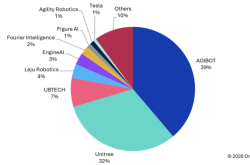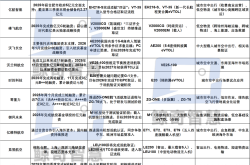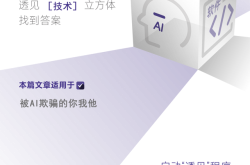Cloud Computing Faces Changes: Alibaba Cloud and Tencent Cloud "Each Have Their Own Merits"
![]() 04/01 2024
04/01 2024
![]() 821
821
Undoubtedly, low-price strategies are always a powerful weapon, regardless of the industry or time. For instance, in the e-commerce industry, besides Pinduoduo implementing the low-price strategy thoroughly, Taobao and JD.com also emphasize cost-effectiveness as their focus, further highlighting their "price power" through subsidies and flash sales. Similarly, the cloud computing industry has once again set off a wave of price reductions, with cloud vendors engaging in a "price war".
On February 29th, cloud service provider Alibaba Cloud announced a comprehensive price reduction for its cloud products on the official website. Over 100 products and over 500 product specifications saw an average price reduction of 20%, with the highest reduction reaching 55%. The new prices took effect immediately. This was the largest price reduction in Alibaba Cloud's history. Shortly afterwards, JD Cloud followed suit with its own price reduction announcement, proclaiming the slogan "Drop prices freely, compete to the end." As cloud service providers engage in a "price war," the cloud computing industry may be poised to undergo a new round of changes.

Image credit: Canva
Why the Collective Price Reduction?
The announcements of price reductions by Alibaba Cloud and JD Cloud have attracted widespread attention. In fact, this is not the first time that cloud computing vendors have reduced prices. Last year, the cloud computing industry saw a round of collective price reductions. In April 2023, Alibaba Cloud announced the largest price reduction in its history at the 2023 Alibaba Cloud Partner Conference, with core product prices reduced by 15% to 50% across the board, and storage products seeing the highest reduction of up to 50%. Subsequently, Tencent Cloud announced price reductions for multiple core cloud products, with some product lines seeing reductions of up to 40%. On the same day, Mobile Cloud also announced price reductions for multiple cloud products, while Tianyi Cloud advertised products at up to 90% off on its homepage. Behind these price reductions by cloud service providers are not without reasons.
On the one hand, changes in the development of the cloud computing industry have led to a slowdown in growth. Previously, with the acceleration of enterprise digital transformation, the demand for cloud services across industries exploded, and cloud service providers entered a fast lane of growth with continuously increasing performance. However, in recent years, due to changes in business strategies and the gradual saturation of internet customers, among other factors, the growth rate of the cloud computing industry has slowed down compared to the past.
According to IDC's "China Public Cloud Services Market (First Half of 2023) Tracker" report, the overall market size of China's public cloud services in the first half of 2023 was US$19.01 billion. Among them, the IaaS market size was US$11.29 billion, with a year-on-year growth rate of 13.2%; the PaaS market size was US$3.29 billion, with a year-on-year growth rate of 26.3%. From the perspective of the IaaS+PaaS market, the year-on-year growth rate in the first half of 2023 was 15.9%, the lowest in the past three years, indicating a continued slowdown in the growth rate of China's public cloud market. Clearly, the slowdown in the growth rate of the cloud computing industry is a fact, and cloud service providers urgently need to find new breakthroughs.
On the other hand, competition in the cloud computing industry is becoming increasingly fierce, and price reduction strategies can attract more customers, thereby driving continuous growth in cloud services business. Nowadays, cloud computing has become an important infrastructure in the digital era and a crucial path for enterprises to achieve digital transformation. Both internet giants and operators are continuously strengthening their efforts in the cloud computing field. As various players continue to enhance their strengths, competition in the cloud computing industry continues to heat up.
Faced with a slowing growth environment and fierce industry competition, anxiety hangs over cloud service providers. Price reductions have become one of the important strategies for cloud service providers to alleviate anxiety. This is because price reduction strategies are the most direct and effective, able to attract more users to try cloud service products. Cloud service providers can also take this opportunity to enter more industries and fields, ultimately promoting an increase in market share.
It is worth noting that, in addition to promoting price reduction strategies, cloud service providers have also made many efforts to compete for more market share and growth opportunities. However, due to different emphases, cloud service providers' strategies also vary.
Alibaba Cloud's "Adjustment"
Alibaba Cloud can be considered a leader in the cloud computing field, not only achieving profitability early but also occupying a high market share. According to IDC's "China Public Cloud Services Market (Third Quarter of 2023) Tracker" report, in the third quarter of 2023, China's public cloud (IaaS+PaaS) market size was 53.566 billion yuan, of which Alibaba Cloud's market share was 26.7%, ranking first in the market. However, although Alibaba Cloud remains the first, its market share has declined. Facing a slowdown in revenue growth and competition from other players, Alibaba Cloud is also actively making adjustments.
Firstly, Alibaba Cloud has undergone a new round of organizational restructuring to adapt to changes in the overall environment and better promote the development of cloud computing business. On November 23rd last year, Alibaba Cloud adjusted its organizational structure, establishing a dedicated public cloud business division for the first time, as well as a hybrid cloud business division. In addition, Alibaba Cloud also established an infrastructure division to build a future-oriented hardware and software integrated underlying infrastructure. With the organizational restructuring, Alibaba Cloud can have more precise and flexible control and management of its business, better adapt to changes in the overall environment, and ultimately accelerate the growth of its cloud business.
Secondly, Alibaba Cloud has increased its focus on public cloud to expand its existing advantages. As a leading player in the cloud computing field, Alibaba Cloud has focused on the rapidly growing non-public cloud market in the past few years. However, due to fierce competition in the non-public cloud market and the inapplicability of Alibaba Cloud's previous experience, Alibaba Cloud has made slow progress in the non-public cloud market. In contrast, public cloud is Alibaba Cloud's forte, with deep accumulation in the early stages, and Alibaba Cloud also occupies the largest market share in the public cloud market, with considerable strength. After clarifying the strategy of "AI-driven, public cloud priority," Alibaba Cloud has increased its focus on public cloud, establishing a dedicated public cloud business division to tap into the potential of the public cloud market.
Thirdly, Alibaba Cloud has launched promotional strategies to attract more customer growth. As mentioned earlier, it is an undisputed fact that the growth rate of the cloud service market has slowed down, coupled with the fact that the largest customer group in the cloud service market, internet companies, have basically adopted cloud services, making it more difficult for cloud service providers to expand their customer base. In this context, price reductions are a good choice to attract users and regain growth. Alibaba Cloud has reduced its product prices, hoping to attract more incremental users and further expand its customer base. Although price reductions will compress profit margins to a certain extent, they can also increase the number and scale of enterprises adopting cloud services, evening out profit differences, and allowing Alibaba Cloud to gain more growth opportunities.
Tencent Cloud's "Transformation"
Tencent Cloud is also a heavyweight player in the cloud computing field, ranking among the top in multiple areas. The increasing complexity of competition and the slowdown in industry growth are clouds hanging over all cloud service providers, and Tencent Cloud is no exception. To achieve sustained and stable growth in its business, Tencent Cloud has also changed its approach.
Firstly, Tencent Cloud has actively transformed from an integrator to an integrated party. Earlier, Tencent Cloud played the role of an integrator, often subcontracting projects to partners after winning them. While this approach allowed Tencent Cloud to acquire a large number of users, it also increased expenses and reduced its profit margins. At the Tencent Global Digital Ecosystem Conference in late 2022, Tang Daosheng, CEO of Tencent CSIG, clearly mentioned that Tencent Cloud would serve as an "integrated party." Tencent Cloud has also begun its transformation, no longer acting as an integrator but instead playing the role of an "integrated party," helping partners complete integration and delivery.
Notably, after firmly shifting to being an "integrated party," Tencent Cloud has achieved significant results, not only achieving revenue growth but also expanding its partner "circle." According to data disclosed by Tencent Cloud, its integrated revenue has increased by 200% year-on-year over the past two years. To date, the number of Tencent Cloud's partners has exceeded 11,000. In terms of partner performance, compared to 2020, the number of Tencent Cloud's partners with annual revenue exceeding one million yuan has increased by 200%, and the number of enterprise customers covered by partners has grown by 80%. In the SaaS field, Tencent Meeting's agency revenue has grown sevenfold.
Secondly, Tencent Cloud has increased its investment in self-developed products to provide better cloud services to customers. Product strength is one of the important considerations for customers when choosing cloud service providers. After abandoning the role of an integrator, Tencent Cloud has begun to focus on the product level and倾斜 more resources and funds to self-developed products. Tencent Cloud has also achieved impressive results in self-developed products. For example, Tencent Cloud's self-developed enterprise-grade distributed database TDSQL once set a new world record in the Transaction Processing Performance Council's TPC-C benchmark, achieving 814 million transactions per minute, ranking first in both performance and cost-effectiveness.
Thirdly, Tencent Cloud continues to focus on下沉市场 to find new growth. As demand in first-tier cities gradually saturates, developing non-first-tier cities has become an unspoken choice for various industries, and the cloud computing industry is no exception. Tencent Cloud attaches great importance to下沉 markets and continues to increase its layout in low-tier cities to expand new market increments. It is understood that in 2023, Tencent Cloud's sales, delivery, architects, channel managers, etc., have all下沉到各个城市, serving customers together with partners.
Final Thoughts
The competition in the cloud computing industry has entered the second half. To maintain and expand their advantages and gain more growth opportunities, Alibaba Cloud and Tencent Cloud have exerted all their efforts and chosen development strategies and directions suitable for their own situations. Alibaba Cloud's recent price reduction has once again drawn attention to the cloud computing field. While Tencent Cloud has not followed suit with a price reduction, it is steadily moving forward at its own pace. It is worth mentioning that with the explosive popularity of AI large models, computing power demand is rapidly increasing, and cloud computing, as a supporting underlying technology, is also affected. Cloud service providers are expected to usher in a new wave of development opportunities.
In conclusion, despite facing pressure from both internal and external sources, cloud service providers represented by Alibaba Cloud and Tencent Cloud are actively seeking change and implementing transformations to achieve performance improvement and growth. The current cloud computing field is still undergoing changes and development, and competition is far from reaching its conclusion. Alibaba Cloud and Tencent Cloud cannot afford to be complacent. Only by continuously improving their strength and competitiveness can they gain an advantage in every transformation and embrace a brighter future.








